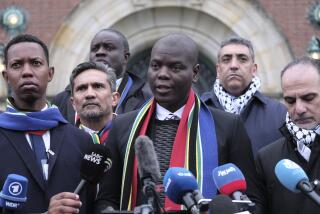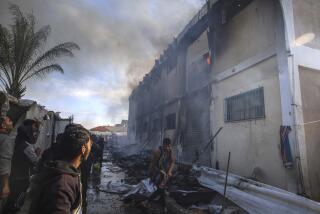Iraq Sets Up War Crimes Court
- Share via
BAGHDAD — Iraq’s Governing Council established a war crimes tribunal Wednesday to try ousted leader Saddam Hussein and his top lieutenants on charges that they committed crimes against the Iraqi people and their neighbors, from the gassing of Kurds to the mass executions of Shiites to the military aggressions against Iran and Kuwait.
Bringing the former regime to justice is a top priority for many Iraqis, but one unlikely to produce immediate gratification.
Although the statute establishing the court allows prosecutions in absentia, a defendant captured after conviction would be entitled to a new trial. Thus any case brought now against Hussein probably would be a limited exercise that would only spotlight the U.S.-led occupation force’s inability to track down its most-wanted suspect.
U.S. authorities, who hold 38 of the 55 most-wanted figures from the former regime, have promised to hand over detainees once they are indicted.
“We agreed that those who have been accused and detained would be handed over to this historic court,” said Abdelaziz Hakim, current president of the Iraqi Governing Council.
However, the coalition is expected to take its time fulfilling that promise.
U.S. and other sources note that the transitional and largely symbolic Iraqi leadership bodies are far from prepared to ensure that war crimes suspects can be securely held in prisons that were heavily damaged by wartime bombardment and are poorly kept.
Coalition forces hold nearly 5,000 prisoners at a high-security encampment at Baghdad’s international airport.
Still, Iraqi authorities said the creation of the new panel was a milestone in the building of democracy and rule of law.
“This tribunal will show the world the horror of crimes committed against the people,” said Dara Noureddine, head of the Governing Council legal committee and a judge once jailed by Hussein for refusing to bend the law to the dictator’s liking.
The U.S. government is providing $75 million for war crimes investigations, in addition to funds already budgeted for the justice system.
The tribunal, which will be an exclusively Iraqi forum, has been designed to respond to local notions of justice, first and foremost the fervent national embrace of the death penalty as punishment for particularly heinous crimes.
Coalition Provisional Authority officials suspended executions months ago, but Iraqi officials will assume responsibility for running the country after a planned June 30 hand-over of power. Then, the Iraqi legal code that allows capital punishment is expected to return.
Trials of the most noted suspects, such as former Foreign Minister Tariq Aziz and Ali Hassan Majid, the Hussein lieutenant known as “Chemical Ali” for his 1988 attack on a Kurdish village with poisonous gases, would take six months to prepare, say those setting up the court. That promises to make the current prohibition against capital punishment “a moot issue,” said the council’s legal liaison, Salem Chalabi, as public pressure for the ultimate penalty will ensure its imposition.
Amnesty International, the London-based human rights watchdog, immediately challenged the Iraqi tribunal’s legitimacy, noting that it had been created under U.S.-led occupation and that its support for capital punishment made it “inconsistent with international human rights standards.”
Iraqi legal experts contend there are justifiable reasons for choosing a national path instead of collaborating with established international tribunals, such as those trying accused war criminals from the former Yugoslav federation, Rwanda, East Timor and Sierra Leone.
Despite the expenditure of $100 million in less than a decade by the international courts based in the Netherlands, fewer than two dozen convictions have been secured in cases from Rwanda and the Balkans, said Iraqi human rights lawyer Feisal Istrabadi.
“These are seminal events in international history but not something the [national] legal community can be proud of. International tribunals are slow and cumbersome,” said Istrabadi, who is an advisor to Governing Council member Adnan Pachachi.
Although Istrabadi opposes capital punishment because of its abuse under previous regimes, he acknowledges that it is overwhelmingly favored by Iraqis who don’t want to see the architects of oppression spared to conform to a liberal principle while underlings tried in Iraqi criminal courts could face execution for carrying out the orders of their bosses.
“It is an anomaly of the international legal system that Saddam Hussein would not be subject to the death penalty but some corporal who fired one bullet and killed one victim would be” if the deposed leader were tried by an international tribunal and the subordinate by an Iraqi criminal court, Istrabadi said.
The tribunal does bow to some established Western legal principles, such as presumption of innocence and the right of an accused to a state-funded attorney.
The Governing Council statute creating the tribunal gives it jurisdiction over Iraqi nationals and residents of the country and in crimes committed between July 17, 1968, when the Baath Party came to power, and May 1, 2003, when President Bush declared major combat operations over.
Judges will be appointed by the 25-member Governing Council, assuming the tribunal takes shape before July. Otherwise, the next executive and legislative body, the Transitional Assembly, which is expected to be handed power by the occupational coalition a little more than six months from now, will decide who sits on the war crimes court.
The news conference convened to announce the tribunal took place in a former museum known as the Clock Tower, where Hussein displayed the gifts lavished on his regime by visiting dignitaries. It will serve as one of the courtrooms for the tribunal and stands ready, with green damask drapes, a new carpet, a wooden dock for defendants and half a dozen rows of wooden pews for the public to watch the trials.
Prospects for cases before the new tribunal are vast.
At least 260 mass graves have been located in Iraq in the eight months since the fall of Baghdad to coalition forces. Those sites, believed to hold the remains of at least 300,000 people, are being investigated and could provide evidence for further arrests and prosecutions.
Iraqi officials announcing the tribunal took pains to present it as a forum of justice and not as a vehicle for revenge.
“What we have created is a tribunal based on justice, law and fairness,” Noureddine said.
More to Read
Sign up for Essential California
The most important California stories and recommendations in your inbox every morning.
You may occasionally receive promotional content from the Los Angeles Times.











